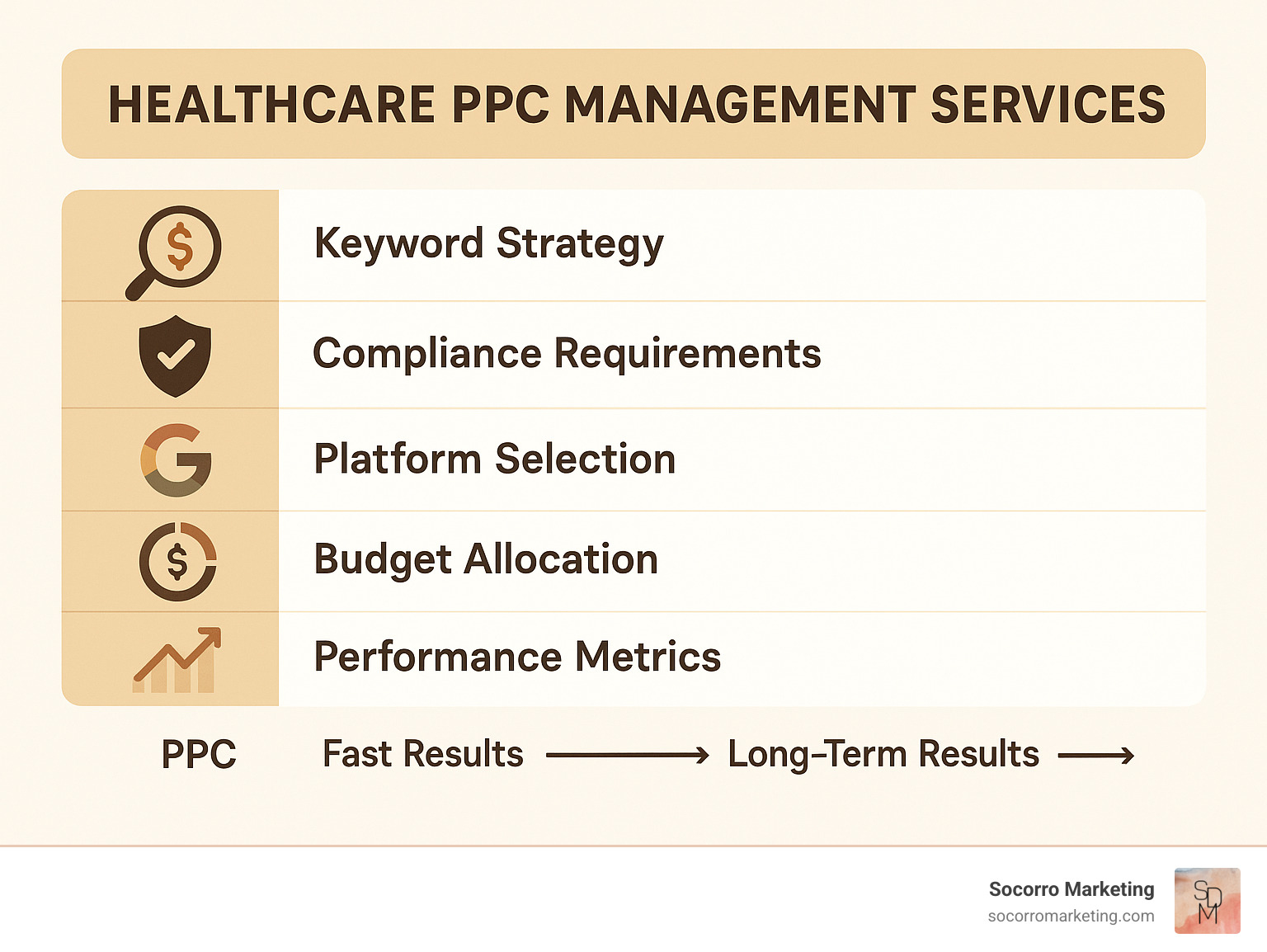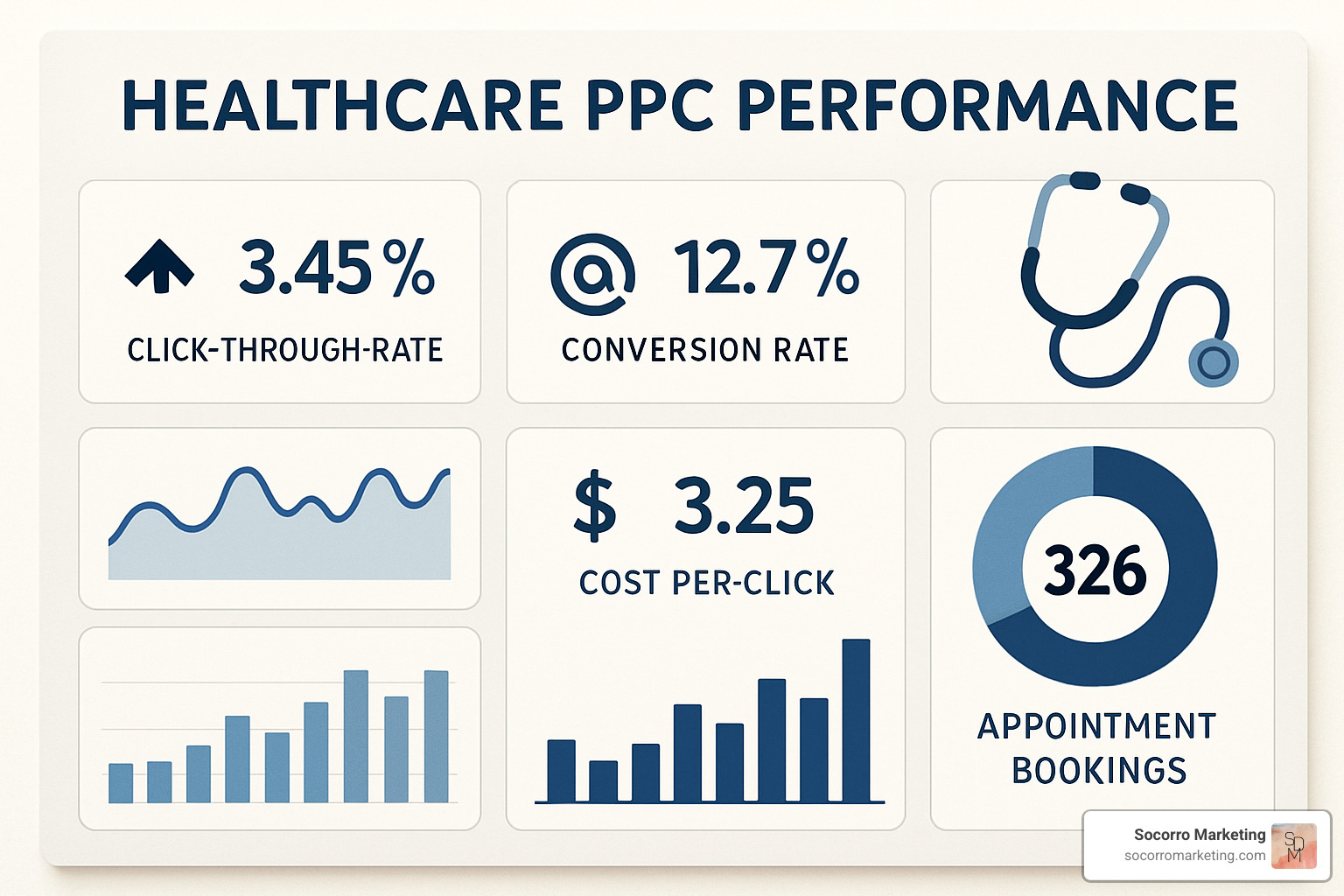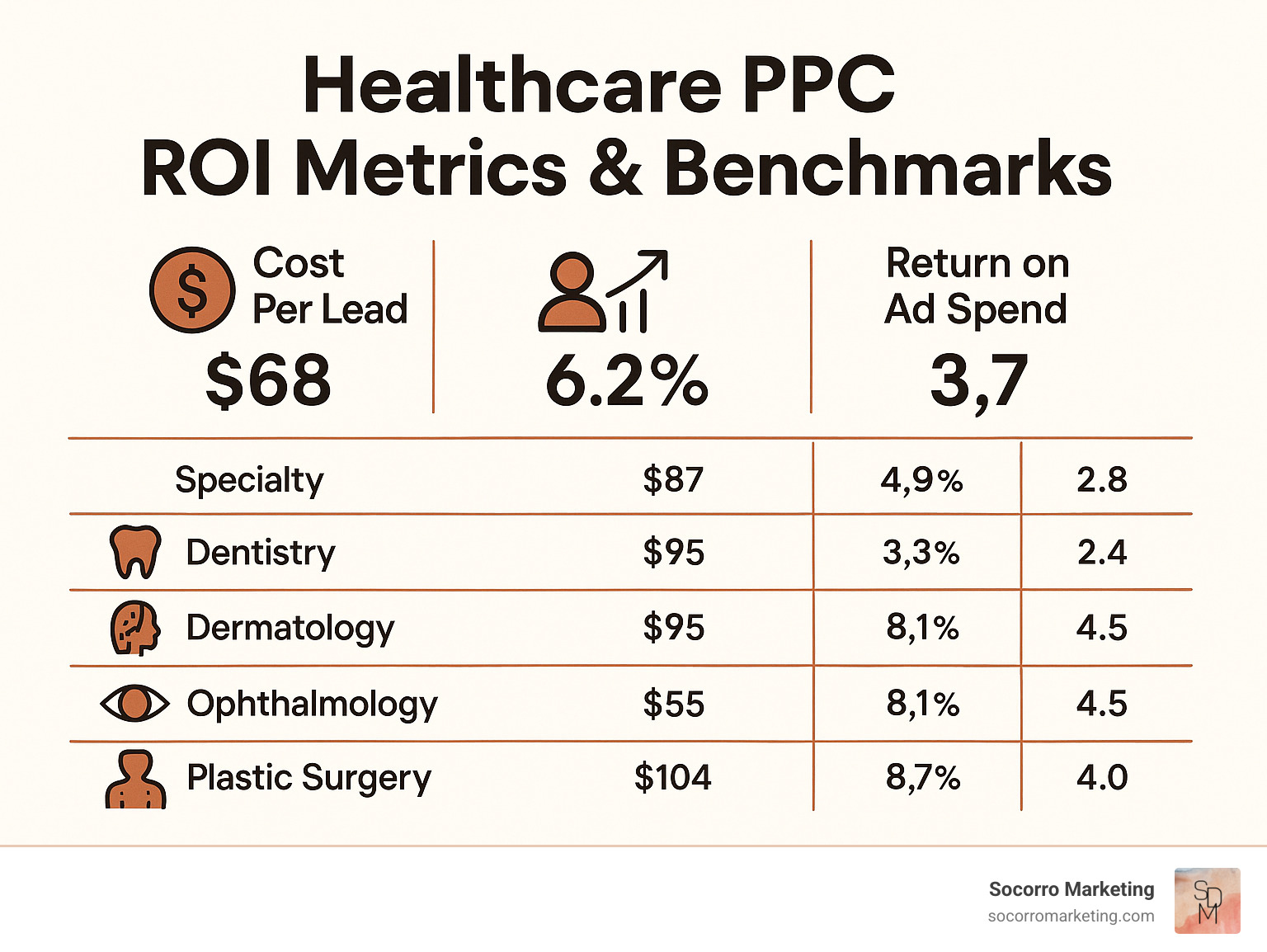Healthcare PPC management services help medical practices and healthcare organizations attract new patients through targeted paid advertising campaigns on Google, Bing, and social media platforms. Here's what you need to know:
Key Benefits:
Essential Components:
The healthcare industry faces unique challenges in digital advertising. With 5% of all Google searches being healthcare-related and patients increasingly starting their provider search online, having a strategic PPC approach isn't optional anymore - it's essential for practice growth.
Unlike general marketing agencies, healthcare PPC requires deep understanding of medical terminology, patient psychology, and strict compliance requirements. Generic campaigns often waste budget on irrelevant clicks or violate healthcare advertising policies.
I'm Grace Ascione, a registered nurse with an MBA and Google Ads certification who has spent over 15 years helping healthcare businesses grow through strategic digital marketing. My clinical background allows me to create healthcare PPC management services that truly understand both the medical and business sides of practice growth.

This comprehensive guide is designed for three key audiences who need to understand the complexities of healthcare digital advertising:
Practice Owners - You're responsible for growing your patient base while managing costs. You need to understand what makes healthcare PPC different from other industries and how to evaluate potential marketing partners.
Healthcare Marketers - Whether you're new to medical marketing or transitioning from other industries, you need specialized knowledge about compliance requirements, patient psychology, and the unique challenges of healthcare advertising.
Clinicians - As healthcare professionals increasingly take on business responsibilities, understanding digital marketing fundamentals helps you make informed decisions about your practice's growth strategy.
Think of pay-per-click advertising as renting a prime spot in a busy medical district. Every time someone walks by and shows interest in your practice, you pay a small fee. But here's the catch - 93.4% of users only check the first page of search results. If your practice isn't visible there, you might as well be located in a basement with no signage.
Healthcare PPC management services solve this visibility problem by placing your practice at the top of search results when potential patients need you most.
The healthcare search landscape is massive and growing. 5% of all Google searches are healthcare-related - that translates to roughly 70,000 health-related searches happening every single minute. These aren't casual browsers; these are people with real health concerns actively looking for solutions.
What makes healthcare PPC particularly effective is how well it performs compared to other industries. Healthcare advertisers see an average click-through rate of 6.11%, which is significantly higher than most sectors. There's a reason 85% of hospital ad budgets go to Google Ads - it simply works when done correctly.

When someone searches for "cardiologist near me," Google runs an instant auction among all the practices bidding on that keyword. Your ad's position isn't just about your bid amount - it's calculated using a formula that rewards quality and relevance.
Ad Rank equals your bid amount multiplied by your Quality Score and the expected impact of your ad extensions. This Quality Score is Google's way of measuring how helpful and relevant your ad is to the searcher.
Google evaluates three key components for Quality Score. Relevance measures how well your ad matches what someone is actually searching for. Landing page experience looks at whether your website is helpful and easy to steer once someone clicks. Expected click-through rate is based on how well your ads have performed historically.
This is where having clinical expertise makes a real difference. When you understand medical terminology and patient concerns, you can create ads that truly resonate with searchers. Better relevance leads to higher Quality Scores, which means lower costs and better ad positions.
Healthcare marketing gets complicated because you're not just dealing with one type of decision-maker. The concerns of a worried parent searching for a pediatrician are completely different from those of a hospital administrator evaluating medical equipment vendors.
Patient-focused campaigns need to address the emotional side of healthcare decisions. People are often anxious about their health, so your ads need to build trust and provide reassurance. They want to know you're conveniently located, accept their insurance, and can see them soon.
Healthcare Professional (HCP) campaigns operate on an entirely different level. These decision-makers want clinical evidence and outcomes data. They care about your professional credentials, specializations, and how you'll communicate with referring physicians.
The timelines are dramatically different too. A patient with acute symptoms might book an appointment within hours of searching. But B2B healthcare sales can take months or even years to close.
Healthcare advertising feels like walking through a minefield sometimes. The rules are strict, the stakes are high, and one wrong step can shut down your entire campaign. But once you understand the landscape, it becomes much more manageable.
The biggest challenge? Healthcare keywords are expensive. We're talking about some of the highest cost-per-click rates across all industries. I've seen single clicks for terms like "addiction treatment" or "cosmetic surgery" cost $50 to $100 or more.
Beyond the cost factor, healthcare advertising operates under multiple layers of regulation that simply don't exist in other industries. You're dealing with HIPAA requirements that protect patient information, Google's healthcare policies that restrict certain medical claims, state medical board regulations that vary by location, and FDA guidelines that are particularly strict for medical devices and pharmaceuticals.
HIPAA compliance in PPC campaigns requires careful attention to how you collect and handle patient data. The key is building privacy protection into every step of your marketing funnel.
Call tracking needs special consideration in healthcare. We use HIPAA-compliant systems that track campaign performance without recording conversations or storing protected health information.
Form security becomes critical when patients submit health-related information. Your landing page forms should integrate directly with EMR systems to protect patient data from the moment someone hits "submit."
Analytics configuration requires a delicate balance. You need enough data to optimize campaigns, but you can't collect any protected health information. We configure Google Analytics with privacy filters that track performance metrics while staying completely HIPAA compliant.
Google's Healthcare and Medicines Policy adds another layer of complexity. The policy restricts advertising for unapproved pharmaceutical products, requires special certification for clinical trial recruitment, limits addiction treatment service targeting, and prohibits promotion of speculative or experimental treatments.
I've seen too many practices waste weeks getting their ads approved because they didn't understand healthcare advertising restrictions. The most common mistakes are actually pretty easy to avoid once you know what to watch for.
Overpromising results is the fastest way to get ads disapproved. Claims like "guaranteed cure" or "100% success rate" violate medical advertising standards across all platforms. Instead, focus on your qualifications, experience, and patient care approach.
Targeting sensitive health conditions gets tricky with Google's remarketing policies. You can't create audiences based on health conditions or medical history. This means you need to be creative with targeting strategies that respect patient privacy while still reaching relevant audiences.
Using prohibited terms can trigger automatic disapprovals. Certain addiction-related keywords require special certification and have strict targeting limitations.
Landing page mismatches frustrate both Google and potential patients. If your ad mentions a specific treatment, your landing page must clearly explain that service.
Effective healthcare ppc management services require a sophisticated approach that goes beyond basic keyword bidding. Our campaigns are built on several key foundations:
Campaign Structure - We organize campaigns by service line, location, and patient type to maximize relevance and control budgets effectively.
Responsive Search Ads - These dynamic ads test multiple headline and description combinations, typically achieving 5-15% higher click-through rates than standard search ads.
Geographic Targeting - Healthcare is inherently local. We typically use a six-mile radius for most medical practices, adjusting based on specialty and competition.
Smart Bidding Strategies - We use Google's machine learning to optimize for conversions rather than just clicks, focusing on actual patient acquisitions.

Keyword Research goes beyond basic medical terms. We research:
Negative Keyword Lists are crucial in healthcare to avoid irrelevant clicks:
Single Keyword Ad Groups (SKAGs) allow precise control over messaging and bidding for high-value terms.
Google Ads remains the primary platform, capturing the majority of healthcare search traffic. We focus on:
Microsoft Ads (Bing) offers 20% market share with 40% lower costs than Google, making it valuable for budget-conscious practices.
LinkedIn works well for B2B healthcare marketing, reaching hospital administrators, practice managers, and other healthcare professionals.
Successful healthcare ppc management services require continuous optimization based on performance data:
A/B Testing - We systematically test ad copy, landing pages, and targeting to identify top-performing combinations.
Conversion Rate Optimization (CRO) - Landing page improvements can dramatically impact campaign ROI. We've seen conversion rate increases of 100%+ through strategic page optimization.
Call Tracking - Since many healthcare conversions happen via phone, we track which campaigns and keywords drive the highest-quality calls.
For more detailed optimization strategies, check out our guide: Struggling with Google Ads? 4 Tips to Optimize Your PPC Campaign
Healthcare ad copy must balance several competing priorities: being compelling enough to generate clicks while remaining compliant with medical advertising regulations.
Effective Healthcare Ad Headlines:
Responsive Search Ads (RSAs) allow us to test multiple variations automatically. According to responsive search ads insight, these ads typically outperform standard ads by testing different combinations of headlines and descriptions.
Compliance Considerations:
Healthcare landing pages have unique requirements that differ significantly from other industries:
Above-the-Fold Elements:
Trust and Security Features:
Form Optimization:
Mobile Optimization:
When it comes to healthcare ppc management services, tracking the right metrics makes the difference between burning through your budget and building a thriving patient base. Too many practices get caught up in vanity metrics like impressions or clicks, but what really matters is whether your ads are bringing in patients who need your care.
Cost Per Click (CPC) in healthcare typically ranges from $3.16 to $6.69, though specialty services often see much higher rates. We've seen competitive terms like "addiction treatment" or "cosmetic surgery" cost $50-100+ per click.
Cost Per Lead (CPL) - the amount you pay to get a potential patient's contact information - usually falls between $68 and $300+. This varies dramatically based on your specialty and local competition.
Return on Ad Spend (ROAS) is where the rubber meets the road. Healthcare practices typically see returns ranging from 3:1 to 15:1, meaning every dollar spent generates three to fifteen dollars in revenue.
Conversion rates in healthcare advertising average between 2.6% and 12.33%. The higher end usually represents urgent care or pain management services where patients have immediate needs.
Customer Acquisition Cost (CAC) - your total investment to bring in a new patient - typically ranges from $300 to $1,000+. This might seem high, but when you consider that a single patient might be worth thousands in lifetime value, the math works out beautifully.
The metrics that really tell the story go deeper than these surface numbers. Patient Lifetime Value (LTV) captures the total revenue from an ongoing patient relationship. Appointment Show Rate tells you what percentage of booked appointments actually happen. Treatment Acceptance Rate shows how many consultations turn into actual treatment plans.

Healthcare PPC budgets aren't one-size-fits-all. What works for a family practice in a small town won't make sense for a multi-specialty clinic in a major metropolitan area.
Small practices typically start with $1,000 to $3,000 monthly budgets. This includes family medicine, internal medicine, and pediatric practices serving a limited geographic area. At this level, we focus on high-intent local keywords and emphasize Google Local Service Ads.
Specialty practices usually need $3,000 to $8,000 monthly to compete effectively. Cardiology, orthopedics, and dermatology practices face higher competition and serve larger service areas. These budgets allow for multiple campaign types including search, display, and video advertising.
Large healthcare systems with multiple locations and specialties typically invest $10,000+ monthly. These complex operations require sophisticated campaign structures, advanced targeting, and extensive automation to manage effectively.
When allocating your budget, we recommend putting 70-80% toward search campaigns since these capture patients with the highest intent. Display and remarketing campaigns get 10-15% for brand awareness. Video campaigns receive 5-10% for patient education and building trust.
Healthcare marketing is inherently local, which makes geographic and device targeting absolutely crucial for campaign success.
Geographic patterns reveal that patients typically travel 6-15 miles for routine care like family medicine or urgent care visits. However, specialty services can draw patients from 50+ mile radiuses, especially in rural areas where specialists are scarce.
Device performance varies significantly based on patient intent and urgency. Mobile searches often indicate immediate need - think "urgent care near me" or "emergency dentist." Desktop users tend to research more thoroughly before booking, comparing providers and reading reviews.
Click-to-call rates are consistently highest on mobile devices, which makes sense when someone needs medical care quickly. We optimize campaigns to take advantage of these patterns, adjusting bids and messaging based on device performance.
We use heat mapping and location data to identify exactly where your best patients come from, then adjust targeting and budgets accordingly. This data-driven approach helps maximize your return on investment while ensuring you're reaching patients who genuinely need your services.
Let me address the most common questions I hear from healthcare providers about PPC advertising. These concerns come up in nearly every consultation, so you're definitely not alone in wondering about these topics.
Here's the honest truth: healthcare PPC isn't cheap, but it doesn't have to break the bank either. Most practices need at least $1,000-$2,000 per month in ad spend to see meaningful results, plus management fees on top of that.
Why this minimum? Healthcare keywords are expensive - sometimes $20, $50, or even $100 per click for competitive terms. With a tiny budget, you might get 10-20 clicks per month, which isn't enough data to optimize effectively or maintain consistent visibility.
Smaller budgets can work for very specific services in less competitive markets. A family practice in a rural area might succeed with $500-$800 monthly, while a cosmetic surgeon in a major city might need $10,000+ to compete effectively.
The key is starting with enough budget to gather meaningful data, then scaling up what works. I'd rather see you start with $1,500/month and do it right than waste $300/month on a campaign that can't possibly succeed.
HIPAA compliance in PPC can feel overwhelming, but it's absolutely manageable when you know what to focus on. The main rule is simple: don't collect, store, or use protected health information in your marketing.
Data collection is where most practices get nervous. You can absolutely collect names, phone numbers, and email addresses for appointment booking - that's not protected health information. The problems start when you ask about specific symptoms, conditions, or medical history in your forms.
Remarketing gets tricky because you can't target people based on the specific medical pages they visited. Instead of creating an audience of "people who visited our diabetes page," create broader audiences like "people who visited our website."
Call tracking needs special attention. We use HIPAA-compliant systems that don't record conversations or store detailed call information. The tracking shows which campaigns drove calls, but it doesn't capture any medical discussions.
The good news? Once you set up compliant systems, maintaining them is straightforward. We handle all the technical details so you can focus on treating patients.
This is where my nursing background really helps - I understand that not all patients are created equal from a business perspective. The metrics that matter most are the ones that directly impact your practice's financial health.
Cost per scheduled appointment is far more valuable than cost per lead. A lead might fill out a form but never book an appointment. A scheduled appointment represents genuine patient intent and immediate revenue potential.
Patient lifetime value changes everything about how you evaluate campaigns. That $200 cost per lead looks expensive until you realize that patient stays with your practice for five years and generates $15,000 in revenue.
Treatment acceptance rate tells you about lead quality in ways that basic metrics can't. If Campaign A generates leads with a 70% treatment acceptance rate while Campaign B's leads only accept treatment 30% of the time, Campaign A is clearly delivering better-qualified prospects.
Revenue per marketing dollar is the ultimate measure. We track which campaigns don't just generate activity, but actually contribute to your bottom line.
Here's what I've learned after years of managing healthcare ppc management services: the cheapest lead is rarely the best lead. A $50 lead who never shows up for their appointment is infinitely more expensive than a $200 lead who becomes a loyal patient and refers their family members.
Managing healthcare ppc management services isn't like running ads for restaurants or retail stores. When someone clicks on your ad, they're not just shopping - they're often scared, confused, or in pain. They need to trust you with their health, their family's wellbeing, and their hard-earned money.
That's why cookie-cutter marketing approaches fall flat in healthcare. You can't just copy what works for other industries and expect it to work for medical practices. The compliance requirements alone will trip up most general marketers, but it goes deeper than that.

At Socorro Marketing, we get it because we've lived it. Our nurse-managed approach and analytic approach means we understand what it's like to be on the other side of that patient interaction. We know the weight of responsibility that comes with healthcare marketing, and we take that seriously.
When we write ad copy, we're thinking about the anxious parent searching for their child's symptoms at 2 AM. When we optimize landing pages, we're considering the elderly patient who might struggle with complicated forms. When we track conversions, we remember that each number represents a real person seeking help.
The healthcare marketing landscape keeps evolving, but the fundamentals remain the same. Patients want to feel heard, understood, and cared for from their very first interaction with your practice. That includes your ads and website.
Success in healthcare PPC comes down to understanding both sides of the equation. You need the marketing expertise to reach patients effectively, but you also need the clinical insight to communicate with them authentically. Most agencies can handle one or the other, but rarely both.
Ready to see what healthcare ppc management services can do for your practice? We'd love to take a look at your current campaigns (or help you get started if you're new to PPC). Our complimentary audit often reveals opportunities that other agencies miss - usually because they don't understand the medical side of your business.
Whether you're a solo practitioner just starting out or part of a large healthcare system, we bring the same clinical perspective to every campaign. Because at the end of the day, we're all in this business to help people feel better and live healthier lives.
Contact us today to schedule your free audit and find how our nurse-managed marketing approach can bring more qualified patients through your doors. We're here in Golden, Colorado, but we work with healthcare practices across the country.
For more information about our comprehensive digital marketing services, visit: More info about digital marketing services
The future belongs to healthcare practices that can connect with patients authentically while navigating the complex world of digital marketing. Let us help you do both.